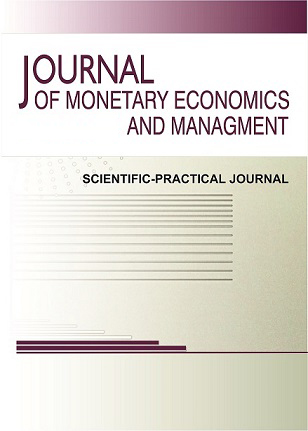student
employee
In the current context of digital transformation, effective knowledge management has become a key factor in maintaining business competitiveness. Large Language Models (LLM) offer new opportunities to automate the processes of knowledge retrieval, structuring, and transfer within organizations. This article analyzes the impact of LLMs on corporate knowledge management, including accelerated access to information, reduced cognitive load on employees, and improved decision-making accuracy. Special attention is given to the economic aspects of implementing LLMs: the potential benefits of reducing time spent on information search, optimizing employee onboarding, and lowering operational costs through the automation of routine tasks are explored. Key challenges are systematized, such as the high cost of development and the risks of confidential data leakage. Based on the analysis of existing research and case studies, the paper proposes criteria for assessing the effectiveness of LLMs in a business environment. It provides an overview of current approaches to technological integration and practical recommendations for adapting LLMs to organizational processes. The findings support the development of a flexible evaluation framework adaptable across industries and business scales, while emphasizing the importance of a balanced implementation strategy that considers both the benefits and risks of the technology.
large language models, LLM, knowledge management, economic efficiency, digital transformation, generative artificial intelligence, automation, AI implementation risks
1. Dudihin V. V., Kondrashov P. E. Metodologiya ispol'zovaniya bol'shih yazykovyh modeley dlya resheniya zadach gosudarstvennogo i municipal'nogo upravleniya po intellektual'nomu referirovaniyu i avtomaticheskomu formirovaniyu tekstovogo kontenta // Gosudarstvennoe upravlenie. Elektronnyy vestnik. – 2024. – № 105. – S. 169–179.
2. Zelenkov Yu. A. Upravlenie znaniyami organizacii i bol'shie yazykovye modeli // Rossiyskiy zhurnal menedzhmenta. – 2024. – T. 22, № 3. – S. 573–601.
3. Stolyarov A. D., Abramov A. V., Abramov V. I. Generativnyy iskusstvennyy intellekt dlya innovaciy biznes-modeley: vozmozhnosti i ogranicheniya // Beneficium. – 2024. – № 3. – S. 43–51.
4. Alavi M., Leidner D. E., Mousavi R. Knowledge Management Perspective of Generative Artificial Intelligence (GenAI) // SSRN Electronic Journal. – 2024. – S. 1–25.
5. Benbya H., Strich F., Tamm T. Navigating Generative Artificial Intelligence: Promises and Perils for Knowledge and Creative Work // Journal of the Association for Information Systems. – 2024. – Vol. 25, № 1. – S. 23–36.
6. Brynjolfsson E., Li D., Raymond L. R. Generative AI at Work // NBER Working Paper Series. – 2023. – No. 31161. – P. 1–65. – Rezhim dostupa: https://www.nber.org/papers/w31161. – Data obrascheniya: 15.06.2025.
7. Dell’Acqua F., McFowland III E., Mollick E. R., Lifshitz-Assaf H., Kellogg K., Rajendran S., Krayer L., Candelon F., Lakhani K. R. Navigating the jagged technological frontier: field experimental evidence of the effects of AI on knowledge worker productivity and quality // SSRN Electronic Journal. – 2023. – S. 1–58.
8. Godest F., [i dr.]. Enhanced LLM for Smart Knowledge Management in Nuclear Industry // Proceedings of the 24th International Conference on Knowledge Engineering and Knowledge Management (EKAW 2024). – Amsterdam: Science and Technology Publications (SCITEPRESS), 2024.
9. Grabuloski M., Karadimce A., Sefidanoski A. Enhancing Language Models with Retrieval-Augmented Generation: A Comparative Study on Performance // WSEAS Transactions on Information Science and Applications. – 2025. – Vol. 22. – S. 272–297.
10. Hindi M., [i dr.]. Enhancing the Precision and Interpretability of Retrieval-Augmented Generation (RAG) in Legal Technology: A Survey // IEEE Access. – 2025. – Vol. 13. – S. 46171–46189.
11. Kostka A., Chudziak J. A. Synergizing Logical Reasoning, Knowledge Management and Collaboration in Multi-Agent LLM System // Proceedings of the International Conference on Artificial Intelligence and Knowledge Systems. – Tokyo: Tokyo University of Foreign Studies, 2024. – S. 203–212.
12. Kuz'minov Ya., Kruchinskaya E. Ocenka vozmozhnostey GenAI dlya resheniya professional'nyh zadach [The Evaluation of GenAI Capabilities to Implement Professional Tasks] // Foresight and STI Governance. – 2024. – № 4 (18). – S. 67–76.
13. Kraus S., Jones P., Kailer N., Weinmann A., Chaparro-Banegas N., Roig-Tierno N. Digital Transformation: An Overview of the Current State of the Art of Research // Sage Open. – 2021. – Vol. 11, № 3. – S. 1–15.
14. Kudryavtsev D., Khan U., Kauttonen J. Transforming Knowledge Management Using Generative AI: From Theory to Practice // Proceedings of the 16th International Conference on Knowledge Management and Information Systems (KMIS 2024). – Porto, Portugal: Science and Technology Publications (SCITEPRESS), 2024. – S. 362–370.
15. Kwon B., Park J., Lee S. Large Language Models: a Primer for Economists // BIS Quarterly Review. – 2024. – S. 37–52.
16. Mariotti L., Guidetti V., Mandreoli F., Belli A., Lombardi P. Combining Large Language Models with Enterprise Knowledge Graphs: a Perspective on Enhanced Natural Language Understanding // Frontiers in Artificial Intelligence. – 2024. – Vol. 7. – Article 1460065
17. McKnight M. A., McDonald P., O’Reilly P. Generative Artificial Intelligence in Applied Business Contexts: a Systematic Review, Lexical Analysis, and Research Framework // Journal of Applied Business and Economics. – 2024. – Vol. 26, № 2. – S. 119–131.
18. Nguyen L. T. K., Connolly J., Nguyen H. N. A Systematic Review of Improving Knowledge Management with Generative AI and Large Language Models // Journal of Advances in Information Technology. – 2025. – Vol. 16, № 4. – S. 594–612.
19. O’Leary D. E. Enterprise Large Language Models: Knowledge Characteristics, Risks, and Organizational Activities // Intelligent Systems in Accounting, Finance and Management. – 2023. – Vol. 30, № 3. – S. 113–119.
20. Petana G., Rosa C. Digital Transformation and the Impact in Knowledge Management // Proceedings of the 12th International Joint Conference on Knowledge Discovery, Knowledge Engineering and Knowledge Management (IC3K 2020). – Budapest, Hungary: Science and Technology Publications (SCITEPRESS), 2020. – S. 180–187.
21. Wahidur R. S. M., [i dr.]. Legal Query RAG // IEEE Access. – 2025. – Vol. 13. – S. 36978–36994.
22. Zhang J. Automated Household Food Management and Recipe Recommendation System Based on Visual Recognition and LLM Knowledge Base // Science and Technology of Engineering, Chemistry and Environmental Protection. – 2024. – Vol. 10, № 1. – S. 1–9.
23. Zhou W., [i dr.]. The Security of Using Large Language Models: a Survey with Emphasis on ChatGPT // IEEE/CAA Journal of Automatica Sinica. – 2025. – Vol. 12, № 1. – S. 1–26.
24. The State of AI: Global Survey // McKinsey [Elektronnyy resurs]. – 2025. – Rezhim dostupa: https://www.mckinsey.com/capabilities/quantumblack/our-insights/the-state-of-ai. – Data obrascheniya: 14.06.2025.









